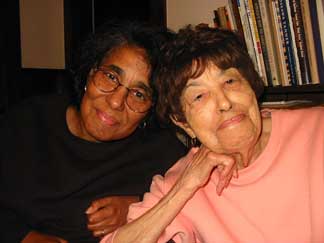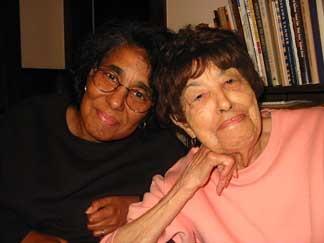 KINGSTON, R.I., Oct. 1, 2014 – The love between a mother and daughter is powerful, but inevitably fraught with some tension.
KINGSTON, R.I., Oct. 1, 2014 – The love between a mother and daughter is powerful, but inevitably fraught with some tension.
The exceptions are rare, and wondrous: How do they do it? University of Rhode Island filmmaker Kendall Moore peers into the lives of a mother-daughter team and stumbles upon a love story for the ages.
“The Good Radical” is 37 minutes of poetry that explores the essence of love – and what really matters in life. The characters are retired University of Rhode Island professor Cynthia Hamilton, now 64, and her mother, Evelyn Hamilton, who died months ago, at the age of 97.
The film will air on Rhode Island PBS Oct. 4, at 11 p.m.
Moore, an associate professor of journalism and film/media, shot the documentary from 2007 to 2009. Her initial idea was to focus on Cynthia’s nationally recognized work as a black studies scholar, including at URI, where she chaired the Africana Studies department for many years.
But Moore soon discovered that a remarkable mother-daughter relationship was unfolding before her, one defined by compassion, loyalty and selflessness.
 In 1993, as she was starting her job at URI, Cynthia was diagnosed with multiple sclerosis. By the mid-90s, the illness had consumed her. She couldn’t walk on her own and relied on a wheelchair to get around.
In 1993, as she was starting her job at URI, Cynthia was diagnosed with multiple sclerosis. By the mid-90s, the illness had consumed her. She couldn’t walk on her own and relied on a wheelchair to get around.
At the age of 80, Evelyn, a retired teacher’s assistant, moved across the country to be near her daughter. They remained devoted to each other, even as dementia clouded Evelyn’s life in her 90s.
“They were so fully engaged with each other,” says Moore. “They were best friends. I feel fortunate to have witnessed that level of devotion between a mother and a child so late in life.”
Cynthia grew up in a tough neighborhood of South Central Los Angeles. A bright child, she went on to Stanford University, where she became an activist.
She fought against a Los Angeles proposal to build an incinerator in her mostly black neighborhood, warning of the health risks – and she spoke throughout the country about racial injustice.
In the film, Evelyn jokes that her daughter was so serious about her activism she “never had any fun.” “Don’t invite her to a party because she’s not going,” jokes Evelyn. In many ways, the two were opposites – Evelyn loved to dance, Cynthia preferred the theater; Evelyn talked to everyone in the room, Cynthia was more reserved. “Myself, I want to go to the party,” says Evelyn.
In 1992, URI selected Cynthia to chair its Africana Studies department. It was a turbulent time. African-American students were holding protests, demanding that the University address their concerns.
Winnie Brownell, dean of the College of Arts and Sciences, recalls in the film how excited the University was to snag Cynthia. “She’s a star,” Brownell says. “Her spirit and energy are just amazing.”
When Cynthia first learned of her illness, she was devastated. “I cried because I didn’t know what to do,” she says. That lasted for 10 hours. Then she got back to work.
But the disease eventually consumed her. Evelyn packed up her belongings in California and moved in with her daughter in Newport, where she lives. She cooked for her. She cleaned the house. She drove her to the Kingston campus – and back home.
The film chronicles their lives together – Evelyn blowing out candles at her 90th birthday party, Cynthia rising from her wheelchair for physical therapy, Evelyn turning the pages of an old photo album, swooning over her late husband, Lumas Hamilton, whom she adored.
The most touching scenes capture the tenderness Cynthia shows for her mother as dementia ravages her mind. The caretaking roles are reversed – emotionally.
In one scene, Evelyn is talking on the phone with a relative and says that Cynthia went “all out” on her birthday, buying her a black pantsuit. “Red,” says Cynthia, gently. “What did I say it was?” says Evelyn, glancing down at the new outfit she’s wearing. “Oh, red. Red.”
In another segment, Evelyn is asked if she fears death. No, she says. Her daughter won’t be alone. She has health aides coming in daily to make sure she’s okay. “I don’t feel bad now,” she says. “We have help.”
Cynthia retired from URI four years ago, partly so she could take care of her mother.
Evelyn died in March.
“The movie is the last spoken word I have of my mom,” says Cynthia. “So I’m glad.”
Cynthia just completed a book in her mother’s honor, “Every Cook Can Govern: At Friendship and Kay Street.” She describes it as a memoir and commentary on alternative medicine. She typed it with one finger.
Next fall, she’ll return to URI to teach an urban politics course. Her mother, she says, “got her back on her feet” – and there she will remain.
Click for information about the film.
Pictured above: Cynthia Hamilton and her mother, Evelyn, at their house in Newport. Photo courtesy of Kendall Moore.
Kendall Moore, an associate professor of journalism and film/media at the University of Rhode Island. Photo courtesy of Kendall Moore.

